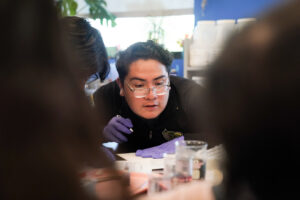TNTP’s seminal report, The Opportunity Myth, found that students need four key resources in their daily school experiences in order to master the skills they need to meet their goals: grade-appropriate assignments, strong instruction, deep engagement in what they are learning, and high expectations from teachers who believe they can meet grade-level standards. We laid bare the truth that far too many students – particularly students of color, those from low-income families, multilingual learners, and students with mild to moderate disabilities – have even less access to these resources than their peers. Painfully, this data is not new or surprising.
In 2019, we launched the Kansas City Opportunity Accelerator (KCOA) to explore what could be possible for marginalized students if school leaders had the chance to double down on their commitment to equity by dismantling inequitable systems that do not deliver on the promise of education. With every year that students are denied access to the four key resources, they fall further behind not only in grade-level learning, but also in the potential for reaching life-altering goals like finishing high school with robust options for social and economic mobility. The urgency of these compounding losses demanded that we imagine a new way forward, not simply work around the current system, which was designed to produce the results we currently see in public education.
With the backing of the Hall Family Foundation and Sherman Family Foundation, both based in the Kansas City area, TNTP started a completely free, two-year program for leaders and leadership teams in a cohort of schools. Through the program, we provided monthly, on-site leadership coaching focused on helping leaders dismantle inequitable systems in their schools. “There’s not always capacity at the district level to provide leaders with coaching, and the KCOA helped to fill that void. We partner with leaders and their teams to identify what is most important to work on, set a goal, and monitor their progress over two years,” said Jon Richard, Partner for the Midwest Region.
Kansas City, like many cities across the country, has a long history of systemic oppression of people of color that has resulted in ongoing residential and educational segregation. Our Opportunity Myth research made it clear that students of color and those attending high-poverty schools have the least access to the four resources overall, and the schools in our first cohort were no exception. When we started KCOA, just 13% of ELA assignments and 44% of math assignments were grade-level appropriate across the six participating schools. Further, only 18% of teachers believed students could master the standards by the end of the year.
Longfellow Elementary School, for example, serves a population that is 100% qualified for free or reduced-price lunch, and 95% students of color. Together with her leadership coach, cohort, and school team, Dr. Jimmie Bullard helped the students farthest behind in math and ELA make the highest gap-closure gains in all of Kansas City Public Schools last year. “For me, [the Opportunity Accelerator] was a total game-changer, because now I’m very focused and intentional. Our teachers know the work, our parents know what we’re doing, and our students know that this is what we’re focusing on. Every student will be presented with grade-level work, and we’re going to allow our students to grapple – because they have strong minds, and they can do it,” she said.
Schools in a KCOA cohort start off by building an understanding of what the four key Opportunity Myth resources are. They reflect on what change management will need to happen to make positive impact possible, beginning with preparing the school community to receive the data from TNTP’s Opportunity Scorecard. Equity work requires honest self-critique and examination around complex, systemic issues of race and class, and requires authentic, vulnerable conversations that may be hard to broach with staff. This scorecard provides a snapshot of the current state of access to the four resources in each school, and serves as a starting point for the school leadership team’s goal-setting process.
Leadership coaches then partner with school leadership teams to develop a two-year strategic plan based on the scorecard results. The work of dismantling systems can be challenging on many levels, which is why we regularly convene cohort members to share experiences, strategize effective ways to act on the findings of their scorecards, and build a community of like-minded leaders who are focused on increasing equity in their schools and redefining what education can look like.
As Ashley Gann, Assistant Principal at Lincoln College Preparatory Academy Middle School, shared with me, “the questions my coach asked us to consider literally transformed how my teachers think about the questions they ask their kids in relation to the academic standards.” It was a common, unconscious practice for many teachers – even exemplar teachers – to look at the standards and automatically lower the level of the questions they planned to ask students. “The KCOA is helping us focus on what matters, and the teachers can see that we weren’t even close to the bar for what we need to be doing for our kids.”
Over the past three years, we’ve seen significant equity gains across KCOA cohort schools. For example, schools increased the time students spent on grade-level assignments by an average of 34 additional hours per school year – from 69 to 103 hours out of 180 in a school year. The time students spent receiving strong instruction increased by an average of 30 hours per year – more than double the number of hours of strong instruction from the baseline scorecard evaluation.
With TNTP’s new north star of social and economic mobility, KCOA is continuing to push principals and school teams to recognize what’s at stake in the long-term for kids who do not get consistent access to the four key resources. Every conversation we have with school leaders must be rooted in the systemic issues of race and poverty that hold some students back while others thrive. We know that the sustainability of this work depends on making sure leadership teams stay focused, committed to equity, and able to independently assess the level of access their students have to the four resources. Going forward, we will continue to help Kansas City schools cut through the noise and focus on the elements that will have the greatest impact on achievement – for all students.








